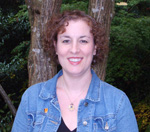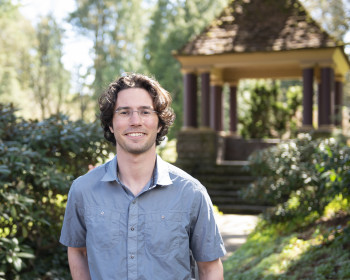Podcast: Students find job market advantage in liberal arts, global education experience
Open gallery

Given the dual forces of a tightening job market and increased performance expectations placed on entry-level positions, students entering the workforce this year will face a more challenging transition than any in recent years.
As Lewis & Clark students enter the workforce, their focus on seeking global understanding and creating new knowledge aligns them with industries’ needs, especially in this time of economic turmoil.
“This is not a time to be fearful,” said Minda Heyman, director of the Center for Career and Community Engagement. “You can’t do anything from a position of fear. Instead, our office is working to empower students by encouraging them to get involved in the job-search process early and helping them tell their own stories. When students know who they are and what they have to offer to a company or organization, they’re able to take charge of their job search.”
For Lewis & Clark students, telling one’s story means articulating the connections between myriad experiences that extend far beyond the classroom, including overseas trips, internships, volunteer experiences, leadership positions, and extracurricular activities.
“Our students are tremendously talented and they are taking part in all sorts of different experiences that can help set them apart from other applicants during their job search,” Heyman said. “We’re here to help students synthesize those experiences with what they’re learning in the classroom in order to determine their path and purpose.”
The advantage of a liberal arts education and cohesive, diverse alumni community
Throughout a student’s time at Lewis & Clark, the Center for Career and Community Engagement (referred to on campus as 3CE) encourages students to make a sustained investment to the job search process. 3CE also focuses on helping students to find engagement opportunities and prepare for transitions to graduate school and the professional world by offering resources such as one-on-one meetings, resume and cover letter assistance, mock interviews, and job fairs.
This spring, 3CE also hosted a special guest lecturer on campus to help students understand how the job market has shifted and what skills are most important to businesses in the current economy. Phil Gardner, an expert in college labor markets, spoke to students, faculty, and administrators about the harsh realities of the current market.
This is a recording of Gardner’s presentation (mp3).
Despite the current economy, he said, companies are hiring liberal arts students because their skills and experiences uniquely qualify them to enter jobs and immediately make an impact on business. As Gardner’s research has shown, entry-level positions have evolved in the wake of a boom in internships and now require new employees to engage in continuous learning, integrate global perspectives, and create new solutions.
At Lewis & Clark, students are continually challenged both in and out of the classroom to develop such attributes and perspectives, which is particularly relevant given the present level of competition in the professional world.
Both Heyman and Gardner stress the importance of networking as students embark on their job search. The interpersonal connections students make through their workstudy jobs, internships, study abroad trips, and other experiences, form the basis of students’ professional networks.
“Building relationships is becoming increasingly significant,” Heyman said. “A job search is not simply submitting an application anymore. It’s a communication process.”
Careers for Pioneers, a biannual networking event collaboratively organized by 3CE, Alumni and Parent Programs, and the Board of Alumni, capitalizes on the natural affinity that exists between students and alumni. Heyman hopes to continue to increase collaboration with alumni, citing the significance of such opportunities for current students.
“The alumni’s willingness to help current students build the relationships and internship opportunities that will expedite their transition into careers is so important,” Heyman said.
The Lewis & Clark alumni network is a diverse community, representing many different sectors in the job market and geographic locations around the world.
Finding value in thinking of the path, not the destination
The paths Lewis & Clark students take after graduation are comprised of many different stepping stones, Heyman said, which underscores a central mission of liberal arts education: to create life-long learners whose insatiable curiosity and adaptability makes them invaluable to countless industries. Particularly this year, graduates likely will not go directly into their careers.
Examples abound of students tapping opportunities in both influential and diverse settings around the world. Isaac Holeman ’09, will spend the next year working for an organization he co-founded in Malawi, using technology to increase access to health care. Ben Brysacz ’09 will head to Washington D.C. after graduation for an internship with the Public Service Academy, on his way to law school. For Katie Walter ’09, the next step after graduation will be Northern India, where she will conduct research to assess the salience of religious and economic themes in advocating environmental stewardship. In each case, students’ liberal arts experience at Lewis & Clark has prepared them for serious, substantial work, paving the way for careers as innovative leaders and engaged citizens of the world.
“The question we pose to graduates shouldn’t be ‘What are you going to do for the rest of your life?’ but ‘What will you do for the next year or two?’ By shifting that question, it puts the emphasis on one’s ability to grow and learn and know oneself,” Heyman said.
The initial steps Lewis & Clark students take after graduation often include service work in organizations like AmeriCorps, Teach for America, and Peace Corps. Nationwide, applications to public service programs have ballooned in recent years, with a spike this year, due to both President Obama’s call to action and the recession. With an alumni participation rate among the top in the nation, Lewis & Clark consistently prepares individuals for positions in public service.
“It’s in the DNA here,” Heyman said. “Lewis & Clark students want to make a difference and want to help solve the problems they see in the world. For some, that means joining Teach for America, for others, it’s Peace Corps or another position in the public interest.
“No matter which route our students choose after graduation, our role is to prepare them to digest these diverse experiences and understand how the experiences and their outcomes shape who they are bring them closer to finding their calling.”
More Newsroom Stories
Public Relations is located in McAfee on the Undergraduate Campus.
MSC: 19
email public@lclark.edu
voice 503-768-7970
Public Relations
Lewis & Clark
615 S. Palatine Hill Road MSC 19
Portland OR 97219

